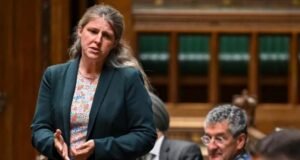
The PM will accuse Jeremy Corbyn of “a cowardly insult to democracy” later for not backing a general election.
Boris Johnson – who sources say regards this as the first day of an election campaign – will argue the Labour leader is denying people their say on the progress of Brexit.
On Wednesday, MPs blocked Mr Johnson’s plan for an early election.
But House of Commons Leader Jacob Rees-Mogg said another motion on this would be put before Parliament on Monday.
Shadow chancellor John McDonnell said Labour wanted an election but its priority was stopping a no-deal Brexit.
Opposition parties are in talks about how to respond to the prime minister’s call for a snap election on 15 October, amid concern over whether a poll should be delayed until after an extension has been agreed to prevent a no-deal Brexit on 31 October.
A bill aimed at preventing a no-deal Brexit was approved by the Commons on Wednesday and a deal was agreed in the early hours of Thursday that Tory peers would not attempt to talk it out – filibuster – in the Lords.
The government says this bill will complete its passage through the Lords on Friday.
Meanwhile, the prime minister’s brother Jo Johnson has quit as Tory MP and minister, saying he is “torn between family and national interest”.
And elsewhere, independent MP Luciana Berger, who left the Labour Party for Change UK earlier this year, has joined the Liberal Democrats, saying she was joining “in the national interest, to offer a vital, positive alternative to Johnson and Corbyn”.
In a speech later, Mr Johnson will again attack what he calls “the surrender bill” for paving the way for more “dither and delay”.
Number 10 said the bill “would in essence overturn the biggest democratic vote in our history – the 2016 referendum”.
It added: “The PM will not do this.”
Labour and other opposition MPs say they will not back the prime minister’s call to have a general election while the option of a no-deal Brexit on 31 October remains open to Mr Johnson.
Mr McDonnell told BBC Breakfast Labour would only agree once they have ensured the legislation to protect against a no-deal Brexit, but he would prefer to have an election “later rather than sooner”.
He told Radio 4’s Today programme that Labour was “consulting” with other opposition parties “to determine the date” of a general election.
“The problem that we’ve got is that we cannot at the moment have any confidence in Boris Johnson abiding by any commitment or deal that we could construct, that’s the truth of it,” he said.
“So we are now consulting on whether it’s better to go long therefore rather than to go short.”
He also acknowledged there were splits in the party about the timing of a general election, saying that the leadership was in contact with legal experts and other opposition parties about what to do.
Liberal Democrat leader Jo Swinson said she believed Mr Johnson could try to press ahead with a no-deal Brexit, despite the legislation.
“I do have confidence that the bill will get through the House of Lords,” she said.
“But in the current circumstances where we find ourselves, where we’ve got a prime minister seemingly prepared to do anything to rip up the traditions of parliamentary democracy, then I also think that we need to be very aware of the risks.”
Meanwhile, The Brexit Party leader Nigel Farage has warned Mr Johnson that he “cannot win an election, whenever it comes, if the Brexit Party stands against him”.
However, if they were to make a pact during a general election “with a clear policy, we’d be unstoppable”, he told BBC Breakfast.
Elsewhere, legal challenges against Mr Johnson’s plan to shut down Parliament next week are taking place.
The High Court in England will consider a judicial review request from Gina Miller, the businesswoman who successfully challenged the government over the triggering of the Article 50 process to start the Brexit countdown, who will be joined by former Prime Minister John Major.
In Scotland, there is an appeal against a ruling that said the prime minister had not broken any laws by asking the Queen to suspend Parliament.
And in Belfast, a judicial review against the government by a campaigner arguing that no deal could jeopardise the Northern Ireland peace process, has been fast-tracked and will be heard later.
What has happened to the bill?
Media captionLord Ashton of Hyde says Brexit bill will be ready to be presented for royal assent
In the Lords, peers sat until 01:30 BST, holding a series of amendment votes that appeared to support predictions of a marathon filibuster session – designed to derail the bill.
What does the no-deal bill say?
But then Lord Ashton of Hyde announced that all stages of the bill would be completed in the Lords by 17:00 BST on Friday.
The proposed legislation was passed by MPs on Wednesday, inflicting a defeat on Mr Johnson.
The bill says the prime minister will have until 19 October to either pass a deal in Parliament or get MPs to approve a no-deal Brexit – and after that he will have to request an extension to the UK’s departure date to 31 January 2020.
However, an extension would require the agreement of the EU, a point which Brussels correspondent Adam Fleming says is being made “quite strenuously” by EU officials.
And Michel Barnier, the chief European Brexit negotiator, is reported to have told European diplomats that negotiations with London over the terms of Britain’s withdrawal from the EU are in a state of paralysis.
He also advised that the UK appeared intent on reducing the level of ambition in the political declaration that will steer the next stage of the negotiations.
Responding to the comments, Downing Street said it rejected Mr Barnier’s assessment.
The PM’s official spokesman said: “Both sides agree to continue talks tomorrow after constructive discussions yesterday and we have seen from EU leaders that there is a willingness to find and agree solutions to the problems we have with the old deal.”
Don't Miss
 Weekly Bangla Mirror | Bangla Mirror, Bangladeshi news in UK, bangla mirror news
Weekly Bangla Mirror | Bangla Mirror, Bangladeshi news in UK, bangla mirror news







